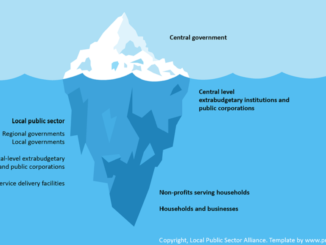
LPSA’s Regional Working Group on Europe & Central Asia (ECA) Open Meeting took place on March 12, 2025, (10:00 EST/ 15:00 GMT/ 16:00 CET/ 20:00 UZT). The meeting was opened and moderated by LPSA ECA Co-Chair, Mr. Adrian Ionescu, Chief Technical Advisor, Public Administration at UNDP Moldova. The session focused on the role of regional development strategies in the European Union accession process, highlighting governance models, institutional structures, and funding mechanisms that support local and regional governments.
Mr. Thomas Prorok, Managing Director at the KDZ Centre for Public Administration Research (Austria) provided an overview of the European Union’s budget allocation, focusing on the Multi-Annual Financial Frameworks (MFF) and the Recovery and Resilience Facility (RRF). He highlighted a shift in budget priorities, noting that funding for the common agriculture policy and the cohesion policy has decreased, while new and reinforced priorities such as the Horizon Europe programme or the Neighbourhood Development have gained prominence. He also discussed the European Semester, a governance framework that provides country-specific recommendations and strengthens the European Commission’s control over budget usage.
Looking ahead, Mr. Prorok discussed the current financial situation and the preparations for the upcoming Multi-Annual Financial Framework starting in 2028. He emphasized a more focused, simpler, and flexible budget designed to address new priorities. However, he raised concerns about a potential reduction in funding for social and cohesion policies. He also highlighted the performance-oriented financing approach, which links funding to measurable indicators and country-specific recommendations. While this approach aims to improve efficiency, it may pose challenges for regional and local governments in securing funding.
Mr. Prorok also presented the fiscal decentralization report of South Eastern Europe, comparing local budgets across countries. He noted a decline in municipalities’ own revenues and an increased reliance on national transfers. Discussing local taxation, he pointed out that local governments in the region have limited tax authority compared to some EU countries, with Austria not serving as a strong model for fiscal decentralization.
In a discussion on local governance and EU accession, Mrs. Biljana Cvetanovska Gugoska, Programme Specialist on Local Governance and Integrated Local/Urban Development at UNDP, RBEC Istanbul Regional Hub (Türkiye) highlighted the impact of global uncertainties and foreign policy shifts on local governments. She emphasized that these external factors significantly shape local and regional development policies. While Mr. Prorok’s presentation focused on the EU’s financial framework, Mrs. Cvetanovska Gugoska pointed out that its influence extends beyond EU member states, directly affecting policy decisions in the Western Balkans and Eastern Partnership countries as they advance toward EU accession. A key debate emerged around whether EU financing mechanisms are actively promoting decentralization or unintentionally driving centralization.
“The identification of funding priorities—whether for green development, social policies, or other areas—will likely remain at the local level. This creates a two-way dynamic when considering performance-based financing. For EU accession countries, this is not new, as their entire reform agenda is built around performance-linked payments. However, it is evident that the EU is also moving towards closer monitoring of how member states allocate and utilize their funding. This places both EU member states and accession countries on a more equal footing in terms of meeting performance requirements to secure additional financing”, mentioned Mrs. Cvetanovska Gugoska during the discussion.
However, the decline in municipal own-source revenues contradicts ongoing efforts to strengthen fiscal autonomy. As the next EU budget programming period approaches, these trends are expected to intensify, raising important questions for local governance practitioners. The central challenge remains: How can local and regional governance experts effectively influence these shifts to ensure stronger local fiscal independence and counterbalance centralization?
Mr. Zoltán Pámer, Research fellow, HUN-REN Centre for Economic and Regional Studies, Institute of Regional Studies (Hungary), discussed territorial governance and organizational pattern of cross-border cooperation in Slovenia, Hungary, and Croatia. Slovenia has a strong local government system but no elected regional level, making local governments crucial for regional development. Hungary’s local government system is more decentralized, but with smaller municipalities and limited funding, relying heavily on EU funding. Croatia, with a strong county system and more balanced representation in cross-border cooperation.
The analysis of cross-border cooperation programs revealed that Slovenia is state-dominated, while Croatia is more decentralized with a strong county presence. Hungary, while more centralized, shows a strong role for national bodies in funding, especially in larger cities. In discussing the challenges and incentives for local governments in cross-border cooperation, Pamer highlighted that such projects provide the greatest benefits to small towns, particularly in regions where funding opportunities are scarce. However, Mr. Pámer noted that Hungarian local governments face significant financial challenges due to limited funding and the need for national co-financing. Universities (Hungary) and private nonprofit organisations (Slovenia, also Hungary) may fill the gap of missing regional institutions.
Mrs. Biljana Cvetanovska Gugoska reflected on Mr. Pamer’s presentation, highlighting key challenges in cross-border cooperation, especially for EU accession countries. She noted that while these collaborations were once about fostering good relations, they have now become more technical, focusing on European integration. However, this shift has led to uneven funding between EU member states and candidate countries, causing frustration at the local level. Local governments, civil society organizations, and universities are all affected by this imbalance in cross-border funding.
She also pointed out that NGOs, while active in big cities, often lack financial support, limiting their impact. She linked this to the shrinking space for civil society and stressed the need for targeted funding to keep NGOs engaged in regional development. Mrs. Cvetanovska Gugoska emphasized the need for fairer funding, stronger support for civil society, and a greater focus on climate action. She called for a more inclusive approach to cross-border cooperation, ensuring that all stakeholders—local governments, universities, and NGOs—can fully contribute to regional development and European integration.
Mr. Agron Haxhimali, Executive Director of Institute for Albanian Municipalities (Albania), provided an overview of Albania’s 2014 territorial and administrative reforms, which consolidated the number of local government units from 373 to 61. These reforms aimed to enhance service delivery, improve governance efficiency, and align local policies with EU integration processes. While they have strengthened municipal capacities, they have also raised concerns about the balance between democratic representation and economic efficiency. In particular, the restructuring has led to challenges in financial management, human resources, and service provision, especially in rural and remote areas.
Mr. Haxhimali also highlighted the implications of centralizing key services, such as water utilities, which have reduced local autonomy. He underscored the importance of further institutional capacity building and greater financial independence for municipalities to ensure effective governance. He concluded by emphasizing the need for citizen engagement, transparency, and inter-municipal cooperation as critical factors in Albania’s path toward EU integration.
Mrs. Biljana Cvetanovska Gugoska discussed the challenges faced by Albanian municipalities, emphasizing their strong commitment to improving local service delivery. However, she noted that this ambition is not matched by sufficient funding, and municipalities remain heavily dependent on central institutions to address challenges despite ongoing decentralization efforts. She also raised a key question about the Albanian Government’s plan to establish a Local Governance Academy, asking whether it would genuinely enhance municipal capacity for EU funding and regional development projects or if it was merely a symbolic initiative.
Mr. Adrian Ionescu concluded the meeting and announced the next open meeting of the Regional Working Group on Europe & Central Asia for June 11th, 2025.
A video of the meeting is available on YouTube. The links below provide access to the video segments of the different agenda items.
| Agenda Item | Contributor |
| 1. Welcome and Introduction | Adrian Ionescu ECA Working Group Co-Chair Chief Technical Advisor, Public Administration UNDP Moldova |
| 2. Local Governments in the EU Budget | Thomas Prorok Managing Director at the KDZ Centre for Public Administration Research |
| 3. Discussant | Biljana Cvetanovska Gugoska Programme Specialist on Local Governance and Integrated Local/Urban Development Governance and Peace Building, UNDP Regional Bureau for Europe and the CIS (RBEC), Istanbul Regional Hub, Türkiye |
| 4. Territorial Governance Patterns of Croatia, Hungary and Slovenia: Comparative Analysis Based on Interreg Cross-Border Cooperation Data 2014-2020 | Zoltán Pámer Research Fellow, PhD, HUN-REN Centre for Economic and Regional Studies, Institute of Regional Studies |
| 5. Territorial & Administrative Reform and the Impact on the Organizational & Management Capacity in Albania | Agron Haxhimali Executive Director of Institute for Albanian Municipalities Lecturer of Local Government and Urban Planning at Polis University, Tirana-Albania |
| 6. Q&A | Participants Facilitation: Adrian Ionescu |
| 7. Closing Remarks & Next Steps for the Working Group | Adrian Ionescu |
The next Europe & Central Asia webinar is scheduled for June 11th, 2025– Register Here!
Reminder: You can join any LPSA Expert Working Group free of cost and receive reminders and updates by opting-in to one or more working groups as part of your LPSA Membership registration.





